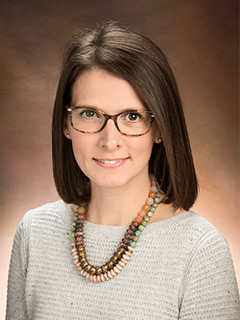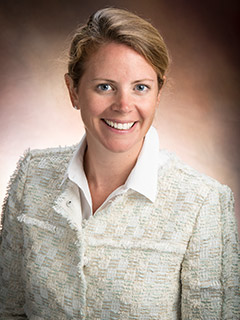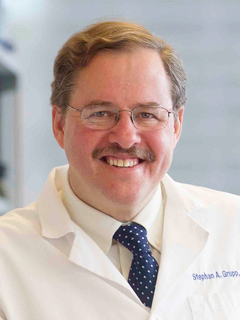HOW CAN WE HELP YOU? Call 1-800-TRY-CHOP
In This Section
Cell and Gene Therapy Collaborative Celebrates 5 Years of Ingenuity, Innovation

The Cell and Gene Therapy Collaborative works to accelerate clinical trials, training, and research.
Children's Hospital of Philadelphia's multipronged strategy as a global leader of cell and gene therapy works to accelerate clinical trials, training, and research to bring life-saving therapies from the bench to the bedside.
Launched in 2019, the Cell and Gene Therapy Collaborative (CGTC) led by Chief Scientific Officer Susan Furth, MD, PhD, and Chair of the Department of Pediatrics Joseph St. Geme III, MD, strives to:
- increase the number of CHOP-developed cell and gene therapy products that have a chance to make it to market and reach as many children as possible
- be a global hub for attracting and cultivating a strong faculty base
- create an ecosystewithm that connects the teams who develop cell and gene therapies, and opens the aperture for more faculty members to become involved in the space.
"We're trying to democratize the approach to cell and gene therapy by making these resources available to as broad a base of faculty as possible," said Katherine Helbig, MS, LCGC, senior director of the CGTC and Frontier Programs. "By doing so, we can increase the number of products we develop and enhance the impact of our research in reaching children — which is the ultimate goal."
With its huge role in the development of the first cell therapy approved by the U.S. Food and Drug Administration and the first FDA-approved gene therapy, CHOP shaped the early legacy of cell and gene therapy for pediatrics. The CGTC ensures that a concerted and strategic effort expands CHOP's infrastructure, grants and resources, and industry collaboration; cultivates talented faculty; and facilitates product development, as the field sees rapid growth.
Cell and Gene Therapy Grant Program Funds Innovation
For five years and counting, the Cell and Gene Therapy Collaborative Grant Program has been funding internal seed grants and acceleration grants. Seed grants offer funding over two years for early-stage development of new ideas, with the goal of achieving preclinical proof-of-concept research by the end of the grant period. Two year acceleration grants provide support for progress in later-stage preclinical programs advancing toward first-in-human testing of new therapies. To date, CHOP has funded 30 grants through the CGTC.
Just as impressive as the number of grants is the diversity of faculty who are funded through the program. Approximately 90 faculty members are engaged in cell and gene therapy research — nearly quadrupling the faculty base since 2019 — with many supported by the grant program.
"It's exciting to see the enthusiasm for our grant program, which has supported our investigators in advancing their creative ideas and moving CHOP towards treating more patients," Helbig said.
CHOP's cell and gene therapy research also is expanding its scope of therapeutic indications, including new gene therapies for sickle cell disease and beta thalassemia that are in clinical trials and moving toward commercialization.
Establishing an Infrastructure to Support Cell and Gene Therapy Researchers
The Clinical In Vivo Gene Therapy Group (CIGT), established in 2021, is one of the newer collaboratives the CGTC has helped to stand up and provide assistance for the researchers doing this work, Helbig said. Led by Lindsey George, MD, this group offers services to support the development and conduct of in vivo gene therapy trials at CHOP. In vivo gene therapies deliver corrective genes directly into a patient's body. Currently there are more than 20 clinical trials for 17 disorders, spanning seven clinical divisions.
CHOP's research has helped to lay the groundwork for six FDA approved in vivo vectors, denoting the CIGT is well on its way to further the development of transformative human therapies:
- voretigene neparvovec-rzyl (Luxturna®, Sparks Therapeudics) for inherited retinal blindness
- onasemnogene abeparvovec-xioi (Zolgensma®, Norvartis) for spinal muscular atrophy
- valoctocogene roxaparvovec-rvox (Roctavian™, Biomarin) for hemophilia A
- etranacogene dezaparvovec-drlb (Hemgenix®, CSL Behring) for hemophilia B
- delandistrogene moxeparvovec-rokl (Elevidys®, Sarepta Therapeutics) for Duchenne muscular dystrophy.
"This work has been ongoing at CHOP for about 30 years, but when it comes to the volume and number of people involved, it's relatively new," Dr. George said. "While we are approaching this work from many disciplines and areas of expertise, we are united by a common goal: To realize the remarkable and transformative potential of gene therapy to impact patients."
Another group supported through the CGTC is the CHOP Engineered Cell Therapy Core (ECTC), led by Stephan Grupp, MD, PhD, a world-renowned expert in ex vivo cell therapy, a gene therapy process that extracts cells from a patient to engineer them in a lab, before infusing back into the patient. An important example of this process is chimeric antigen receptor (CAR) T-cell therapy.
ECTC provides a resource for researchers with promising proof-of-concept to advance their CAR T-cell therapy research through all stages of the preclinical process including design, construction, testing, and validation. They are partnering with Dr. Grupp and the ECTC to take CAR T research in new and exciting directions.
"Some of our investigators are exploring the use of CAR T therapy for conditions like organ failure after transplant, lupus, and other conditions that you never would have considered previously — it's not just about cancer anymore," Helbig said. "It's been great to see the establishment of this infrastructure and the support provided through our grant programs. We are accomplishing what we were hoping to."
The CGTC will continue to promote and foster collaboration and partnership across many areas of the Research Institute including the Raymond G. Perelman Center for Cellular and Molecular Therapeutics, the Cellular Therapy and Transplant Section in the Division of Oncology, the Department of Pathology and Laboratory Medicine, the Division of Human Genetics, the Center for Applied Genomics, the Richard D. Wood Jr. Center for Fetal Diagnosis and Treatment, the Clinical Vector Core, the Research Vector Core, and faculty members from research and clinical programs across the institution.


